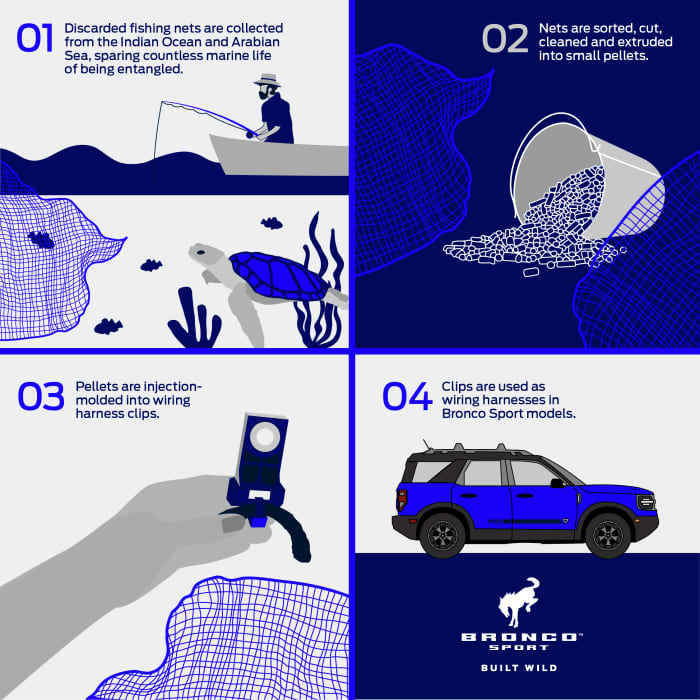This post was originally published on this site
It’s just a tiny clip for second-row passenger seats that helps when side airbags are deployed in the popular Bronco Sport. But it’s a first step for projected wider use of recycled ocean plastics in making Ford vehicles, the automaker said Wednesday.
Ford Motor Co.
F,
said its Bronco Sport SUV — a reintroduced nostalgic model that has a long wait list — now includes 100% recycled ocean-harvested plastic or “ghost gear,” as it’s known, for a particular part. That part is the wiring harness clips, entirely invisible to occupants, which weigh about five grams and guide wires that power side-curtain airbags.
But reusing plastic in the auto industry “is a strong example of a circular economy, and while these clips are small, they are an important first step in our explorations to use recycled ocean plastics for additional parts [and on additional models] in the future,” said Jim Buczkowski, vice president of research at Ford.
The strength and durability of the nylon material equals that of previously used petroleum-based parts, but with a 10% cost savings and less energy required to produce them, the company said.
Ford partnered with DSM Engineering Materials, which collects the plastic material from the Indian Ocean and Arabian Sea. Items produced using plastics collected from the oceans include a wide range of consumer goods, but until now excluded automotive parts.

Ford Motor Co.
Recently, the automaker used recycled water bottles to produce lightweight, aerodynamic-enhancing, noise-reducing underbody shields on its 2020 Ford Escape.
Don’t miss: Recycling is confusing — how to be smarter about all that takeout plastic
Up to 13 million metric tons of plastic enter the ocean each year, threatening marine life and polluting shorelines, according to Pew Charitable Trusts. Much of that is attributed to the fishing industry, which has come to rely on plastic fishing nets and other equipment because of the durability, light weight, buoyancy and low cost of the material.
Those same qualities contribute to creating ghost nets, a fatal and growing threat to marine life. Ghost gear comprises nearly 10% of all sea-based plastic waste, entangling fish, sharks, dolphins, seals, sea turtles and birds.
Rethinking parts isn’t the only climate-minded move at Ford, which is responding to shifting demand and anticipating stronger regulations and incentives on the path to cutting fossil-fuel emissions.
Ford CEO Jim Farley took to Twitter earlier this month to tout the company’s plans to become the second largest electric-vehicle maker behind Tesla
TSLA,
Farley, a longtime Ford executive who took the top job in October 2020, said then that the company is approaching EVs the same way it approached building ventilators and PPE for COVID-19: “Whatever it takes, find a way.”
Read: Chasing Tesla: Here are the current electric vehicle plans of every major car maker
Farley said at the time that Ford was making “final preparations” to launch the F-150 Lightning, the all-electric version of its best-selling F-150 pickup, which had more than 160,000 reservations. The electric Mustang Mach-E is a hit with customers, he said, and Ford will soon start production of the new electric Transit commercial van.
Ford’s stock is up 126% in the year to date, with the S&P 500
SPX,
up nearly 25% over the same stretch.

